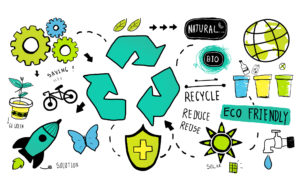 The Sustainability Accounting Standards Board (SASB) is an organization founded in 2018 whose mission is “to help businesses around the world identify, manage and report on the sustainability topics that matter most to their investors.” A growing number of large corporations—GM, Nike, and JetBlue—are including SASB information in their annual reports, even though this isn’t required by the SEC or any other government rule to inform investors of their sustainability practices.
The Sustainability Accounting Standards Board (SASB) is an organization founded in 2018 whose mission is “to help businesses around the world identify, manage and report on the sustainability topics that matter most to their investors.” A growing number of large corporations—GM, Nike, and JetBlue—are including SASB information in their annual reports, even though this isn’t required by the SEC or any other government rule to inform investors of their sustainability practices.
It’s unlikely that investors in small businesses, many of whom are family and friends, will require SASB information, but understanding what this information contains may help owners decide on company policy for sustainability.
What are SASB standards?
The SASB has standards on sustainability that are industry specific. The SASB has a Sustainable Industry Classification System (SICS) comprised of 77 industries within 11 sectors (such as consumer goods, food & beverage, services, and health care); each has its own unique sustainability accounting standards. The term “accounting” does not mean tax and financial in this context, but rather accountability for such aspects as greenhouse gas emissions, human capital management, and wastewater management.
Small business sustainability policy
A UN report defined sustainability in this way: “Sustainability is the ability to meet the needs of the present without compromising the ability of future generations to meet their needs.”
You don’t have to be a Fortune 500 company to adopt sustainable business practices and benefit from them. Adopting these business practices can improve your bottom line:
- Energy conservation (e.g., better lighting choices; less water usage; energy-efficient equipment ) translates into reduced utility bills.
- Less paper consumption means savings on paper, printer toner, etc.
- Being a sustainable business improves your brand, attracting and retaining good employees as well as value-sensitive customers.
An earlier blog on re-thinking your workspace design contains links to help with lighting and temperature controls for comfort and energy efficiency. But don’t stop here. Think about all of the resources you use and how you can do better (e.g., repair instead of replace).
You can learn more from Cultivating Capital’s The Small Business Guide to Sustainable Business Practices. You can also download a free sustainability audit checklist by providing your name and email.
Final thought
From Jane Goodall, world’s foremost expert on chimpanzees:
“You cannot get through a single day without having an impact on the world around you. What you do makes a difference and you have to decide what kind of a difference you want to make.”


